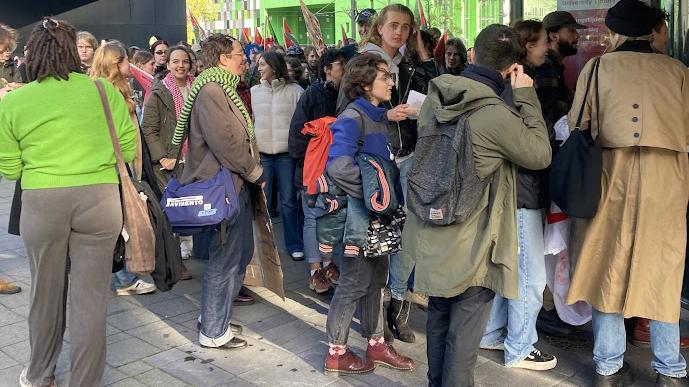Joint statement by 70 Jewish and/or Israeli staff, students and alumni
Polarisation must not drive us further apart

The current conflict in Gaza and Israel has been triggering intense emotions for months now, exacerbating polarisation in Dutch society at an alarming rate. This causes us great concern. It is important to be able to give emotions and concerns a place. Fortunately, we live in a democracy, where demonstrating is a fundamental right. In recent weeks, more and more pro-Palestinian demonstrations have taken place. Unfortunately, we see and hear slogans being shouted and/or pictures being displayed during these demonstrations that give us a great sense of unsafety.
Slogans
For Jews and Israelis, a slogan like “Globalise the intifada” is a call to violence, referring to the first and second intifadas, when terror attacks killed many innocent Israeli civilians. "From the River to the Sea" is a slogan that we associate with the dismantling of the State of Israel, the only Jewish state in the world. More so, Hamas uses it to call for the violent expulsion of Jews from Israel.
Additionally, there are many misunderstandings surrounding the term Zionism, which seems to mean something different to everyone. In Jewish religious texts, we refer to Jerusalem by the name of Zion, it is strongly embedded in our religious practice and Jews have lived there for millennia. Zionism is the political movement that grew out of the desire and necessity for a safe place for Jewish people. In this state, we would have the right to exist and the right to self-determination. Therefore, for us, Zionism does not carry the violent and colonial definition attributed to it in the current protests. It can coexist with a free and secure future for Palestinians. When calls are made to exclude and kill Zionists, and when Zionists are compared to Nazis, it is threatening and creates a sense of exclusion.
These slogans incite violence and deny Jewish self-determination in the form of the State of Israel. This, combined with face coverings, flag burning and vandalism, is intimidating and causes some Jewish students and staff to avoid campus.
Role of educational institutions
It is good to see that faculty and staff can also show support for students and other employees. However, it should never come at the expense of the sense of security of other students and colleagues. How do we ensure that there is room for everyone's input, background and beliefs? And that everyone feels welcome and safe?
Educational institutions are open communities, where everyone is allowed to be who they are, meet and inspire each other, look beyond their boundaries and work together to create a better world for everyone. It's a place where one can freely ask questions, discuss and debate. Having respect for everyone's input, background and beliefs is a pre-requisite for making everyone feel welcome and safe. By meeting each other and engaging in dialogue, we can discover new perspectives and opinions that can enrich us and lead to new solutions.
Many of us don't want to be activists at university: we just come here to study or work. We sit next to each other in the lecture halls, collaborate on projects, have meetings, and we all get coffee at break time. But anyone wearing a necklace with a Star of David or a kippa can now expect hatred and incomprehension from fellow students or colleagues: “You are a dirty Zionist” and “You are killing children in Gaza.” If you are lucky, you might at least expect the question “What do you think of Israel?”
In the meantime, Israel is the place where Israelis and Palestinians work together in schools and universities, both teachers and students. It is in these places that we continue, across borders, to engage in dialogue. The protesters, students and teachers demand that educational institutions provide full transparency regarding cooperation with Israeli organisations and universities, stop investing in such corporations and cut ties with those organizations since, according to the protesters, these Israeli organisations are part of a white, colonial power, complicit in genocide. We find it difficult to understand how creating lists of Israeli institutions or scholars with whom cooperation is taking place, or stopping the cooperation with these institutions, fosters the future for Palestinians and Israelis.
Moving forward together
It is never too late to start having a conversation and to build relationships despite having differences. In Jewish tradition, we try to live life with a question mark, not an exclamation point. In the conflict going on now, there are only victims. Whether it is a Palestinian or an Israeli whose life is lost, every life is equally valuable. We are very concerned about the current situation and sympathise with all the victims. We do not want polarisation to drive us apart so that we can no longer talk to each other or stand together for a just cause. We hope that together we can create an environment where we all feel safe and seen again because we know that knowing each other can help us move forward.
Lees ook het interview met een aantal van de auteurs.